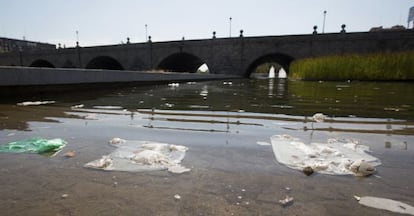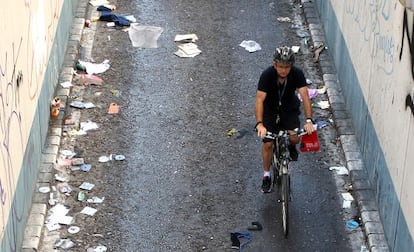“The filth is awful” – Complaints grow over cleanliness of Madrid’s streets
Residents and businesses bemoan the amount of garbage accumulating in the capital

From the north, south, center and outskirts – complaints from residents, businesses and passers-by about the amount of garbage piling up on the streets of Madrid are coming in from all parts of the city.
“It is a common problem that has gotten worse in all the districts,” say officials from the Federation of Madrid Neighborhood Associations.
In August alone, Madrileños filed more than 5,000 complaints over the amount of litter in public areas. In July, the number of complaints reached 7,000.
In Usera, residents have to trample through piles of empty bottles, pet excrement and even dead rats
The city’s efforts to beef up its cleaning crews over the summer have not resolved an issue that, according to some residents, has been a problem for years.
“The streets of Madrid are impassable; the filth is awful,” says María Teresa Rioja, president of the Begoña Neighborhood Association in the Fuencarral-El Pardo district in the north of the capital.
At noon on a recent day in Puente de Vallecas, in the south of the city, trash, cigarette butts, plastic bottles and cans filled the main streets, which no one had come by to clean.
“This is shameful,” said Emilio Martínez, who has worked as a manager at a clothing store for 25 years on Monte Igueldo street. “They only come by here to sweep on Saturdays. The rest of the week, this becomes a pigsty.”
Mayor Manuela Carmena has reached an agreement with private collectors to hire up to 500 new employees
Reductions in the number of street cleaners and the amount of cleaning hours are two of the biggest complaints filed with neighborhood associations, the CCOO labor union and city officials.
“The streets are dirtier because there are fewer and fewer street sweepers,” says Ana Martínez, president of the neighborhood association in the northeastern Ciudad Lineal district. “We are paying the price for a few contracts that allow companies to hire fewer employees.”
There are no longer daily street pickups of unwanted mattresses, furniture or broken appliances, which accumulate on the city’s streets, Martínez explains.

Last week Madrid Mayor Manuela Carmena reached an agreement with private garbage collectors to hire up to 500 new employees to clean the streets and parks around the city.
This agreement will allow the city to draw up new cleaning schedules before the end of the year, said city environmental chief Inés Sabanés.
In the last two years, cleaning contractors have reduced their number of employees from 6,315 to 4,312. On top of that, a further 408 others have been affected by a layoff plan initiated at the end of 2013.
“Before, the trucks that hose down the streets used to come by every day. Now, they never show up and this is what we have to deal with,” says Jorge Esteban, a grocery store owner in Puente de Vallecas, as he points to stains and filthy puddles on the sidewalk.
In Usera, residents have to trample through piles of empty bottles, pet excrement and even dead rats.
Meanwhile, plastic bags line the areas along the Manzanares river while at the Príncipe Pío metro station, piles of clothes and even unwanted school supplies build up on the sidewalks.
In Lavapiés, Moratalaz, Tetuán, Moncloa, Ciudad Lineal and Puente de Vallecas the same scenes are on display: waste cans and trash containers filled to capacity are surrounded by boxes and plastic bags of garbage waiting to be picked up.
It is a common problem that has gotten worse in all the districts” Federation of Madrid Neighborhood Associations
“Everything smells so bad,” says Emilio Mena, who owns a snack stand. He has called the city six times over the past year.
“This is almost becoming a health risk. The containers are filled, trash is no longer collected and garbage is flowing into the street,” says Mena.
But businesses and neighborhood associations are not just blaming the city.
“The problem is not only the lack of cleaning, but also people who just don’t take care of their surroundings and keep littering,” says Marisa Díaz, president of the neighborhood association in the southern Usera district.
English version by Martin Delfín.
Tu suscripción se está usando en otro dispositivo
¿Quieres añadir otro usuario a tu suscripción?
Si continúas leyendo en este dispositivo, no se podrá leer en el otro.
FlechaTu suscripción se está usando en otro dispositivo y solo puedes acceder a EL PAÍS desde un dispositivo a la vez.
Si quieres compartir tu cuenta, cambia tu suscripción a la modalidad Premium, así podrás añadir otro usuario. Cada uno accederá con su propia cuenta de email, lo que os permitirá personalizar vuestra experiencia en EL PAÍS.
¿Tienes una suscripción de empresa? Accede aquí para contratar más cuentas.
En el caso de no saber quién está usando tu cuenta, te recomendamos cambiar tu contraseña aquí.
Si decides continuar compartiendo tu cuenta, este mensaje se mostrará en tu dispositivo y en el de la otra persona que está usando tu cuenta de forma indefinida, afectando a tu experiencia de lectura. Puedes consultar aquí los términos y condiciones de la suscripción digital.









































